Maison >base de données >Redis >Comment créer un service fastdfs et un service Redis autonome
Comment créer un service fastdfs et un service Redis autonome
- WBOYWBOYWBOYWBOYWBOYWBOYWBOYWBOYWBOYWBOYWBOYWBOYWBavant
- 2023-05-29 08:40:05996parcourir
Construction du service Fastdfs
Vous devez d'abord installer le compilateur gcc:
yum -y install gcc-c++

Installer le package de dépendances lib
tar -zxvf V1.0.43.tar.gz cd libfastcommon-1.0.43 ./make.sh ./make.sh install

ln -s /usr/lib64/libfastcommon.so /usr/local/lib/libfastcommon.so ln -s /usr/lib64/libfastcommon.so /usr/lib/libfastcommon.so ln -s /usr/lib64/libfdfsclient.so /usr/local/lib/libfdfsclient.so ln -s /usr/lib64/libfdfsclient.so /usr/lib/libfdfsclient.so
Installer le service fastdfs
tar -zxvf V6.06.tar.gz cd fastdfs-6.06 ./make.sh ./make.sh install
Configurer le service Tracker
mkdir -p /data/fastdfs/tracker cd /etc/fdfs cp tracker.conf.sample tracker.conf vim tracker.conf
Le le contenu à modifier est :
#启用配置文件(默认启用) disabled=false #设置tracker的端口号,通常采用22122这个默认端口 port=22122 #设置tracker的数据文件和日志目录 base_path=/data/fastdfs/tracker #设置http端口号,默认为8080 http.server_port=80
Démarrer le service
#启动 /usr/bin/fdfs_trackerd /etc/fdfs/tracker.conf start

Vérifier s'il est démarré
#查看启动端口 ss -ant | grep 22122
Vérifier le journal de démarrage
#查看启动日志 tail -f /data/fastdfs/tracker/logs/trackerd.log

Ajouter la commande de démarrage
vim /etc/rc.d/rc.local
Ajouter la commande de démarrage

S'il ne démarre pas automatiquement après le redémarrage, passez la commande
ll /etc/rc.d/rc.local
Vérifiez si rc.local dispose des autorisations exécutables, S'il n'a pas d'autorisations exécutables, autorisez-le via la commande
chmod +x /etc/rc.d/rc.local
Configurer le service de stockage
mkdir -p /data/fastdfs/storage mkdir -p /data/fastdfs/storage/file cd /etc/fdfs cp storage.conf.sample storage.conf vim storage.conf
Le contenu à modifier est
#启用配置文件(默认启用) disabled=false #组名,根据实际情况修改 group_name=group1 #设置storage的端口号,默认是23000,同一个组的storage端口号必须一致 port=23000 #设置storage数据文件和日志目录 base_path=/data/fastdfs/storage #存储路径个数,需要和store_path个数匹配 store_path_count=1 #实际文件存储路径 store_path0=/data/fastdfs/storage/file #tracker 服务器的 IP地址和端口号,如果是单机搭建,IP不要写127.0.0.1,否则启动不成功(此处的ip是我的CentOS虚拟机ip) tracker_server=172.16.6.50:22122 #设置 http 端口号 http.server_port=8888
Démarrer le service
#启动 /usr/bin/fdfs_storaged /etc/fdfs/storage.conf start
Afficher Démarrer le port
#查看启动端口 ss -ant | grep 23000
Afficher le journal de démarrage
#查看启动日志 tail -f /data/fastdfs/storage/logs/storaged.log

Vérifier si le stockage est lié avec succès via le moniteur
[root@localhost /]# /usr/bin/fdfs_monitor /etc/fdfs/storage.conf [2021-09-23 12:59:26] DEBUG - base_path=/opt/fastdfs_storage, connect_timeout=30, network_timeout=60, tracker_server_count=1, anti_steal_token=0, anti_steal_secret_key length=0, use_connection_pool=0, g_connection_pool_max_idle_time=3600s, use_storage_id=0, storage server id count: 0 server_count=1, server_index=0 tracker server is 172.16.8.11:22122 group count: 1 Group 1: group name = group1 disk total space = 6818 MB disk free space = 2169 MB trunk free space = 0 MB ……
Ajouter la commande de démarrage
vim /etc/rc.d/rc.local
Ajoutez la commande de démarrage au fichier
/usr/bin/fdfs_storaged /etc/fdfs/storage.conf start
Testez et vérifiez
[root@localhost ~]# ps -ef|grep fdfs root 10335 17685 0 23:50 pts/3 00:00:00 grep --color=auto fdfs root 13335 1 0 13:17 ? 00:00:07 /usr/bin/fdfs_storaged /etc/fdfs/storage.conf start root 15779 1 0 12:59 ? 00:00:04 /usr/bin/fdfs_trackerd /etc/fdfs/tracker.conf
Utilisez le client fdfs pour tester
cp /etc/fdfs/client.conf.sample /etc/fdfs/client.conf
Lors du test, vous devez définir le fichier de configuration du client
vim /etc/fdfs/client.conf
Après avoir ouvert le fichier, effectuez les modifications suivantes dans l'ordre. xff1a;
#tracker服务器文件路径 base_path=/data/fastdfs/tracker #tracker服务器IP地址和端口号 tracker_server=172.16.7.50:22122 # tracker 服务器的 http 端口号,必须和tracker的设置对应起来 http.tracker_server_port=80
Une fois la configuration terminée, vous pouvez simuler le téléchargement du fichier,Donner/Placer un fichier test.txt dans le répertoire de données, puis essayer de le télécharger en exécutant la commande de téléchargement du client
/usr/bin/fdfs_upload_file /etc/fdfs/client.conf /data/test.txt
3. Déplacez le fichier de configuration vers le répertoire d'installation
tar xzvf redis-4.0.8.tar.gz
4. Configurez redis pour démarrer en arrière-plan
cd redis-4.0.8 make cd src make install PREFIX=/usr/local/redis
Remarque,Changez démoniser non pour démoniser oui, et commenter bind 127.0.0.1, ; à distance
5. Ajoutez redis au démarrage de démarrage
cd ../ mkdir /usr/local/redis/etc mv redis.conf /usr/local/redis/etc
Ajoutez du contenu dedans:
vim /usr/local/redis/etc/redis.conf
Cela signifie appeler cette commande pour démarrer redis au démarrage.
6. Démarrez redis
vim /etc/rc.d/rc.local
7. et redis-server sur bin,afin que la commande redis-cli puisse être utilisée directement dans n'importe quel répertoire
/usr/local/redis/bin/redis-server /usr/local/redis/etc/redis.conf
8 Définissez le mot de passe redis
a Exécutez la commande:
/usr/local/redis/bin/redis-server /usr/local/redis/etc/redis.conf
b. mot de passe redis (l'opération facultative, peut être omise)
Exécutez la commande:
cp /usr/local/redis/bin/redis-server /usr/local/bin/ cp /usr/local/redis/bin/redis-cli /usr/local/bin/
Si aucun mot de passe n'a été défini, le résultat de l'exécution sera celui indiqué ci-dessous
c Paramètres mot de passe redis. Exécutez la commande :redis-cli
 (****** est le mot de passe que vous souhaitez définir),Si le réglage est réussi, le mot « OK » sera renvoyé
(****** est le mot de passe que vous souhaitez définir),Si le réglage est réussi, le mot « OK » sera renvoyé
d Testez la connexion.
Redémarrez le service redis
config get requirepass
Vous pouvez également entrer redis-cli pour accéder au mode commande,utilisez auth '*****' (****le mot de passe défini pour vous)vous connectez
9. Autorisez le réseau externe à accéder à redis
a. Configurez le pare-feu :
config set requirepass *******
b S'il n'est toujours pas accessible à distance:
À ce moment, bien que le pare-feu ait ouvert le port 6379, , le réseau externe est toujours inaccessible , Parce que redis écoute 127.0.0.1:6379, Il ne surveille pas les requêtes du réseau externe.
Commentez le bind 127.0.0.1 dans le fichier de configuration redis.conf dans le répertoire du dossier avec # devant
- Commande : et config get protected-mode sont tous deux non ? Sinon, utilisez config set pour changer l'attribut de nom de configuration en non.
- Autres commandes couramment utilisées liées à redis
-
Désinstaller redis:
//****为你设置的密码 redis-cli -h 127.0.0.1 -p 6379 -a ****
Signaler une exception,Essayez de redémarrer
Cause : Redis a été démarré
Solution : éteignez Redis et redémarrez
#开放6379端口 firewall-cmd --zone=public --add-port=6379/tcp --permanent #重启防火墙以使配置即时生效 systemctl restart firewalld #查看系统所有开放的端口 firewall-cmd --zone=public --list-ports
Ensuite vous Vous pouvez voir Redis fonctionner joyeusement.
客户端检测连接是否正常
使用redis-cli客户端检测连接是否正常
$redis-cli 127.0.0.1:6379> keys * (empty list or set) 127.0.0.1:6379> set key "hello world" OK 127.0.0.1:6379> get key "hello world"
Redis客户端常见操作
Redis是key-value数据库,支持五种数据类型:string(字符串),hash(哈希),list(列表),set(集合)及zset(sorted set:有序集合)。
当value是string类型,命令包括set get setnx incr del 等。
> set server:name "fido" // 设置键值 OK > get server:name // 获取键值 "fido" > setnx connections 10 // set if not exists OK > incr connections // 原子性增加values值 (integer) 11 > incr connections (integer) 12 > del connections // 删除key (integer) 1 > incr connections (integer) 1
当value是list类型,命令包括rpush lpush llen lrange lpop rpop del 等。
> rpush friends "Alice" // 在末尾追加 (integer) 1 > rpush friends "Bob" (integer) 2 > lpush friends "Sam" // 插入到开头 (integer) 3 > lrange friends 0 -1 // 返回列表的子集,类似切片操作 1) "Sam" 2) "Alice" 3) "Bob" > lrange friends 0 1 1) "Sam" 2) "Alice" > lrange friends 1 2 1) "Alice" 2) "Bob" > llen friends // 返回列表长度 (integer) 3 > lpop friends // 删除并返回列表第一个元素 "Sam" > rpop friends // 删除并返回列表最后一个元素 "Bob" > lrange friends 0 -1 1) "Alice" > del friends // 删除key (integer) 1 // 1表示成功,0表示失败
当value是set类型,命令包括sadd srem sismember smembers sunion del等。
> sadd superpowers "flight" // 添加元素 (integer) 1 > sadd superpowers "x-ray vision" (integer) 1 > sadd superpowers "reflexes" (integer) 1 > srem superpowers "reflexes" // 删除元素1 > sismember superpowers "flight" // 测试元素是否在集合中 (integer) 1 > sismember superpowers "reflexes" (integer) 0 > smembers superpowers // 返回集合中所有元素 1) "x-ray vision" 2) "flight" > sadd birdpowers "pecking" (integer) 1 > sadd birdpowers "flight" (integer) 1 > sunion superpowers birdpowers // 合并多个set,返回合并后的元素列表 1) "x-ray vision" 2) "flight" 3) "pecking" > del superpowers // 删除key (integer) 1
当value是zset类型,命令包括 zadd zrange del等,注意给value一个编号用于排序。
> zadd hacker 1940 "Alan Kay" // 给value指定一个编号,比如以年份1940作为编号 (integer) 1 > zadd hacker 1906 "Grace Hopper" (integer) 1 > zadd hacker 1953 "Richard Stallman" (integer) 1 > zadd hacker 1965 "Yukihiro Matsumoto" (integer) 1 > zadd hacker 1916 "Claude Shannon" (integer) 1 > zadd hacker 1969 "Linux Torvalds" (integer) 1 > zadd hacker 1957 "Sophie Wilson" (integer) 1 > zadd hacker 1912 "Alan Turing" (integer) 1 > zrange hacker 2 4 // 切片返回有序集合中元素 1) "Claude Shannon" 2) "Alan Kay" 3) "Richard Stallman" > del hacker // 删除key (integer) 1
当value是hash类型,hash类型可以理解为字典,需要给value指定一个field用于映射,命令包括hset hmset hget hgetall hdel hincrby del 等。
> hset user:1000 name "John Smith" // 给value指定一个field,比如name (integer) 1 > hset user:1000 email "john.smith@example.com" (integer) 1 > hset user:1000 password "s3cret" (integer) 1 > hgetall user:1000 // 获得hash表中所有成员,包括field和value 1) "name" 2) "John Smith" 3) "email" 4) "john.smith@example.com" 5) "password" 6) "s3cret" > hmset user:1001 name "Mary Jones" password "hidden" email "mjones@example.com" // 设置多个field和value OK > hget user:1001 name // 根据field获取value "Mary Jones" > hset user:1000 visits 10 // field可以映射到数字值 (integer) 1 > hincrby user:1000 visits 1 // 原子性增加value的值,增加1 (integer) 11 > hincrby user:1000 visits 10 // 增加10 (integer) 21 > hdel user:1000 visits // 删除field及其value (integer) 1 > hincrby user:1000 visits 1 (integer) 1 > del user:1000 // 删除key (integer) 1
设置和查看key的生命周期,key过期会被自动删除,命令包括expire ttl 等。
> set resource:lock "Redis Demo" OK > expire resource:lock 120 // 设置生命周期为120s (integer) 1 > ttl resource:lock // 查看当前生命周期还剩多少时间 (integer) 109 > ttl resource:lock // 120s后查看,返回-2表示已过期或不存在 (integer) -2 > set resource:lock "Redis Demo 2" OK > ttl resource:lock // 返回-1表示永不过期 (integer) -1
springboot实现h5与fastdfs之间的断点续传,大文件上传,秒传文件和批量上传
对比,只是单纯返回一个String类型?

改为upload_list8888,页面调用是失败的
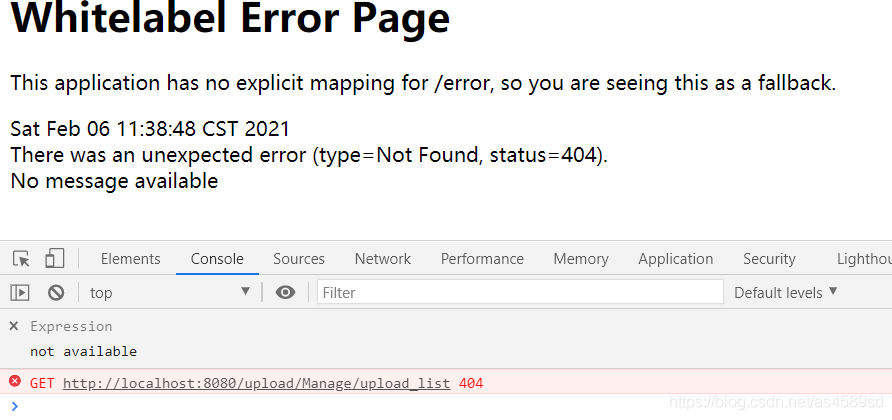
改回upload_list
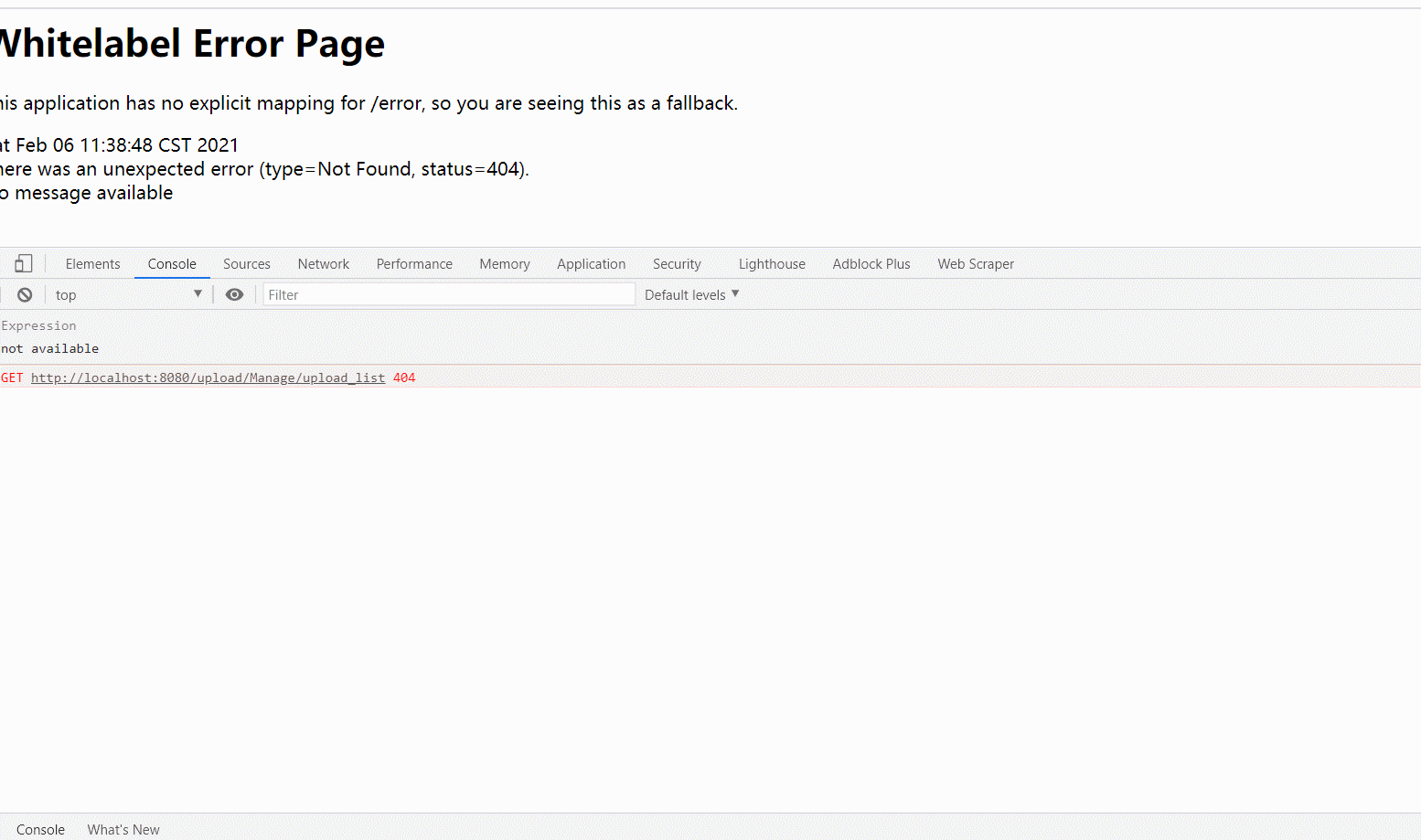
ThreadLocal与redis秒配,解决了redis线程池在被共享访问时带来的线程安全问题
打个比方,现在公司所有人都要填写一个表格,但是只有一支笔,这个时候就只能上个人用完了之后,下个人才可以使用,为了保证"笔"这个资源的可用性,只需要保证在接下来每个人的获取顺序就可以了,这就是 lock 的作用,当这支笔被别人用的时候,我就加 lock ,你来了那就进入队列排队等待获取资源(非公平方式那就另外说了),这支笔用完之后就释放 lock ,然后按照顺序给下个人使用。
但是完全可以一个人一支笔对不对,这样的话,你填写你的表格,我填写我的表格,咱俩谁都不耽搁谁。这就是 ThreadLocal 在做的事情,因为每个 Thread 都有一个副本,就不存在资源竞争,所以也就不需要加锁,这不就是拿空间去换了时间嘛!
了解决redis线程池对象(笔),不能被多线程(多个人)共享访问的问题,通过 threadLocal.set() 方法,将redis线程池对象实例保存在每个线程,自己所拥有的 threadLocalMap中(生成多个副本)。
这样的话,每个线程都使用自己的redis线程池对象实例,彼此不会影响,从而达到了隔离的作用,这样就解决了redis线程池对象在被共享访问时带来的线程安全问题。
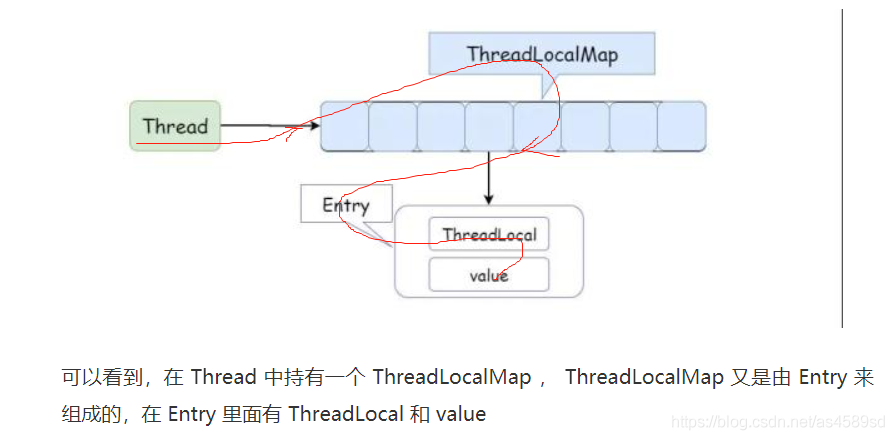
import cn.hutool.core.util.StrUtil;
import org.slf4j.Logger;
import org.slf4j.LoggerFactory;
import redis.clients.jedis.Jedis;
import redis.clients.jedis.JedisPool;
import redis.clients.jedis.JedisPoolConfig;
import java.util.List;
public class RedisUtil {
private RedisUtil() {
}
private static Logger _logger = LoggerFactory.getLogger(RedisUtil.class);
;
protected static final ThreadLocal<Jedis> threadLocalJedis = new ThreadLocal<Jedis>();
//Redis服务器IP
private static String ADDR_ARRAY = ReadProper.getResourceValue("spring.redis.host");
//Redis的端口号
private static int PORT = Integer.parseInt(ReadProper.getResourceValue("spring.redis.port"));
//访问密码
private static String AUTH = ReadProper.getResourceValue("spring.redis.password");
//可用连接实例的最大数目,默认值为8;
//如果赋值为-1,则表示不限制;如果pool已经分配了maxActive个jedis实例,则此时pool的状态为exhausted(耗尽)。
private static int MAX_ACTIVE = -1;
//控制一个pool最多有多少个状态为idle(空闲的)的jedis实例,默认值也是8。
private static int MAX_IDLE = 16;
//等待可用连接的最大时间,单位毫秒,默认值为-1,表示永不超时。如果超过等待时间,则直接抛出JedisConnectionException;
private static int MAX_WAIT = 1000 * 5;
//超时时间
private static int TIMEOUT = 1000 * 5;
//在borrow一个jedis实例时,是否提前进行validate操作;如果为true,则得到的jedis实例均是可用的;
private static boolean TEST_ON_BORROW = true;
private static JedisPool jedisPool ;
//默认的数据库为0
/**
* redis过期时间,以秒为单位
*/
public final static int EXRP_HOUR = 60 * 60; //一小时
public final static int EXRP_DAY = 60 * 60 * 24; //一天
public final static int EXRP_MONTH = 60 * 60 * 24 * 30; //一个月
/**
* 初始化Redis连接池,注意一定要在使用前初始化一次,一般在项目启动时初始化就行了
*/
public static JedisPool initialPool() {
JedisPool jp=null;
try {
JedisPoolConfig config = new JedisPoolConfig();
config.setMaxTotal(MAX_ACTIVE);
config.setMaxIdle(MAX_IDLE);
config.setMaxWaitMillis(MAX_WAIT);
config.setTestOnBorrow(TEST_ON_BORROW);
config.setTestOnCreate(true);
config.setTestWhileIdle(true);
config.setTestOnReturn(true);
config.setNumTestsPerEvictionRun(-1);
jp = new JedisPool(config, ADDR_ARRAY, PORT, TIMEOUT, AUTH);
jedisPool=jp;
threadLocalJedis.set(getJedis());
} catch (Exception e) {
e.printStackTrace();
_logger.error("redis服务器异常",e);
}
return jp;
}
public static void close(Jedis jedis) {
if (threadLocalJedis.get() == null && jedis != null){
jedis.close();
}
}
// /**
// * 在多线程环境同步初始化
// */
// private static synchronized void poolInit() {
// if (jedisPool == null) {
// initialPool();
// }
// }
/**
* 获取Jedis实例,一定先初始化
*
* @return Jedis
*/
public static Jedis getJedis() {
boolean success = false;
Jedis jedis = null;
// if (jedisPool == null) {
// poolInit();
// }
int i=0;
while (!success) {
i++;
try {
if (jedisPool != null) {
jedis=threadLocalJedis.get();
if (jedis==null){
jedis = jedisPool.getResource();
}else {
if(! jedis.isConnected()&&!jedis.getClient().isBroken()){
threadLocalJedis.set(null);
jedis = jedisPool.getResource();
}
//System.out.println(Thread.currentThread().getName()+":第"+i+"次获取成功#@利用了本地缓存redis");
return jedis;
}
}else {
throw new RuntimeException("redis连接池初始化失败");
}
} catch (Exception e) {
System.out.println(Thread.currentThread().getName()+":第"+i+"次获取失败!!!");
success = false;
e.printStackTrace();
_logger.error("redis服务器异常",e);
}
if (jedis!=null){
success=true;
}
if (i>=10&&i<20){
try {
Thread.sleep(1000);
} catch (InterruptedException e) {
e.printStackTrace();
}
}
if (i>=20&&i<30){
try {
Thread.sleep(2000);
} catch (InterruptedException e) {
e.printStackTrace();
}
}
if (i>=30&&i<40){
try {
Thread.sleep(3000);
} catch (InterruptedException e) {
e.printStackTrace();
}
}
if (i>=40){
System.out.println("redis彻底连不上了~~~~(>_<)~~~~");
return null;
}
}
if (threadLocalJedis.get()==null){threadLocalJedis.set(jedis);}
//System.out.println(Thread.currentThread().getName()+":第"+i+"次获取成功@");
return jedis;
}
/**
* 设置 String
*
* @param key
* @param value
*/
public static void setString(String key, String value) {
Jedis jo = null;
try {
value = StrUtil.isBlank(value) ? "" : value;
jo = getJedis();
jo.set(key, value);
} catch (Exception e) {
threadLocalJedis.set(null);
_logger.error("redis服务器异常",e);
throw new RuntimeException("redis服务器异常");
} finally {
if (jo != null) {
close(jo);
}
}
}
/**
* 设置 过期时间
*
* @param key
* @param seconds 以秒为单位
* @param value
*/
public static void setString(String key, int seconds, String value) {
Jedis jo = null;
try {
value = StrUtil.isBlank(value) ? "" : value;
jo = getJedis();
jo.setex(key, seconds, value);
} catch (Exception e) {
threadLocalJedis.set(null);
e.printStackTrace();
_logger.error("redis服务器异常",e);
throw new RuntimeException("redis服务器异常");
} finally {
if (jo != null) {
close(jo);
}
}
}
/**
* 获取String值
*
* @param key
* @return value
*/
public static String getString(String key) {
Jedis jo = null;
try {
jo = getJedis();
if (jo == null || !jo.exists(key)) {
return null;
}
return jo.get(key);
} catch (Exception e) {
threadLocalJedis.set(null);
e.printStackTrace();
_logger.error("redis服务器异常",e);
throw new RuntimeException("redis操作错误");
} finally {
if (jo != null) {
close(jo);
}
}
}
public static long incrBy(String key, long integer) {
Jedis jo = null;
try {
jo = getJedis();
return jo.incrBy(key, integer);
} catch (Exception e) {
threadLocalJedis.set(null);
e.printStackTrace();
_logger.error("redis服务器异常",e);
throw new RuntimeException("redis操作错误");
} finally {
if (jo != null) {
close(jo);
}
}
}
public static long decrBy(String key, long integer) {
Jedis jo = null;
try {
jo = getJedis();
return jo.decrBy(key, integer);
} catch (Exception e) {
threadLocalJedis.set(null);
e.printStackTrace();
_logger.error("redis服务器异常",e);
throw new RuntimeException("redis操作错误");
} finally {
if (jo != null) {
close(jo);
}
}
}
//删除多个key
public static long delKeys(String [] keys){
Jedis jo = null;
try {
jo = getJedis();
return jo.del(keys);
} catch (Exception e) {
threadLocalJedis.set(null);
e.printStackTrace();
_logger.error("redis服务器异常",e);
throw new RuntimeException("redis操作错误");
} finally {
if (jo != null) {
close(jo);
}
}
}
//删除单个key
public static long delKey(String key){
Jedis jo = null;
try {
jo = getJedis();
return jo.del(key);
} catch (Exception e) {
threadLocalJedis.set(null);
e.printStackTrace();
_logger.error("redis服务器异常",e);
throw new RuntimeException("redis操作错误");
} finally {
if (jo != null) {
close(jo);
}
}
}
//添加到队列尾
public static long rpush(String key,String node){
Jedis jo = null;
try {
jo = getJedis();
return jo.rpush(key,node);
} catch (Exception e) {
threadLocalJedis.set(null);
e.printStackTrace();
_logger.error("redis服务器异常",e);
throw new RuntimeException("redis操作错误");
} finally {
if (jo != null) {
close(jo);
}
}
}
//删除list元素
public static long delListNode(String key,int count,String value){
Jedis jo = null;
try {
jo = getJedis();
return jo.lrem(key,count,value);
} catch (Exception e) {
threadLocalJedis.set(null);
e.printStackTrace();
_logger.error("redis服务器异常",e);
throw new RuntimeException("redis操作错误");
} finally {
if (jo != null) {
close(jo);
}
}
}
//获取所有list
public static List getListAll(String key){
Jedis jo = null;
List list=null;
try {
jo = getJedis();
list= jo.lrange(key,0,-1);
} catch (Exception e) {
threadLocalJedis.set(null);
e.printStackTrace();
_logger.error("redis服务器异常",e);
throw new RuntimeException("redis操作错误");
} finally {
if (jo != null) {
close(jo);
}
}
return list;
}
//清理缓存redis
public static void cleanLoacl(Jedis jo){
threadLocalJedis.set(null);
close(jo);
}
static {
initialPool();
}
}使用webuploader组件实现大文件分片上传,断点续传
webuploader:是一个以HTML5为主, Flash为辅的文件上传组件,采用大文件分片/并发上传的方式,极大地提高了文件上传的效率,同时兼容多种浏览器版本;
前端

引入百度Webuploader组件,需要注意标签的id/nama属性,这些将在后面的JavaScript中使用到进行文件切分、验证。

以上js组件,将完成文件上传、MD5验证、删除、切片、上传进度条显示、暂停、继续上传及上传成功/失败时候的回调。
后端
前端,给后端提供封装的chunk,及request
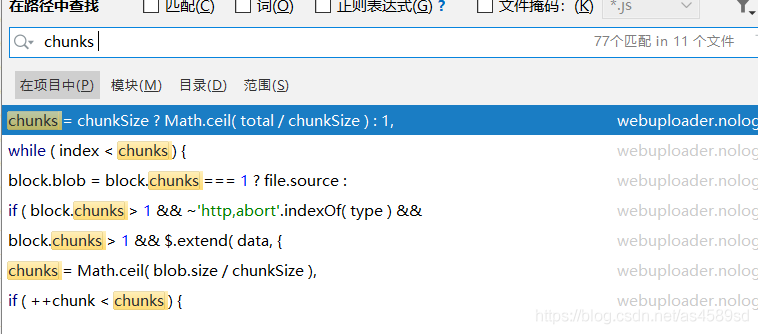
后端,主要是判断文件是否有分片,如果没有,则直接存放到目的目录;
如果存在分片,则创建临时目录,存放分片信息;
之后判断当前分片所属的文件的所有分片是否已经传输完毕,如果当前分片数==所属文件总分片数,则开始合并文件并转移完整文件到目的目录,并且删除临时目录
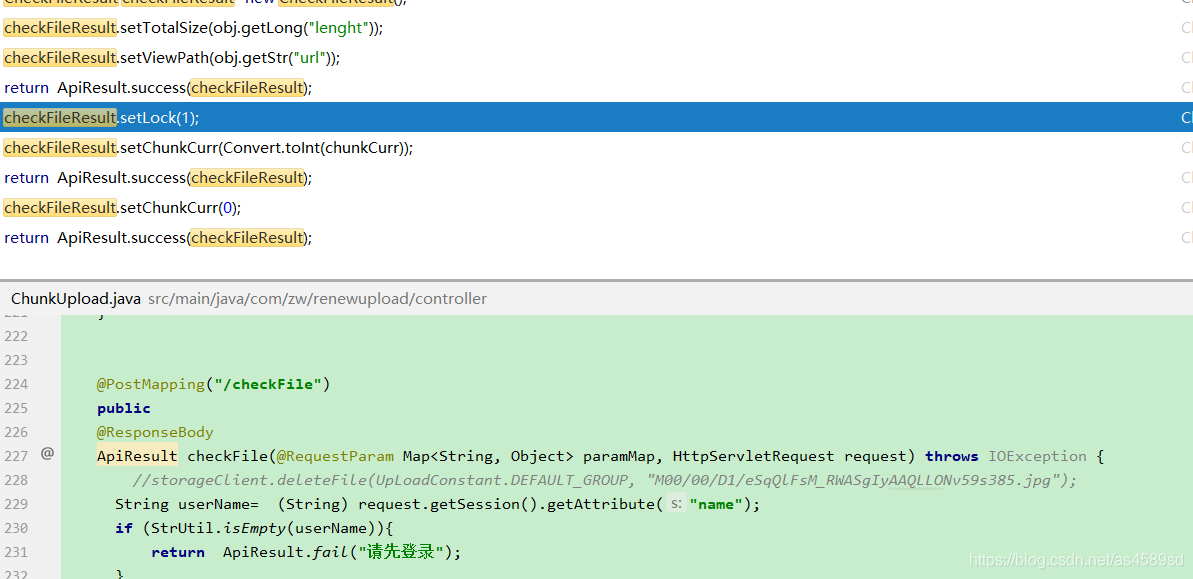
检测完文件,以后,开始上传操作
//上传操作
path = appendFileStorageClient.uploadAppenderFile(UpLoadConstant.DEFAULT_GROUP, file.getInputStream(),file.getSize(), FileUtil.extName((String) paramMap.get("name")));
//更新操作
appendFileStorageClient.modifyFile(UpLoadConstant.DEFAULT_GROUP, noGroupPath, file.getInputStream(),file.getSize(),historyUpload);hutool工具的巧妙运用
可参考hutool资料http://www.mianshigee.com/tutorial/hutool/26e24c7a37d93249.md
<dependency>
<groupId>cn.hutool</groupId>
<artifactId>hutool-all</artifactId>
<version>5.0.6</version>
</dependency>cn.hutool.core.collection.CollUtil判断非空
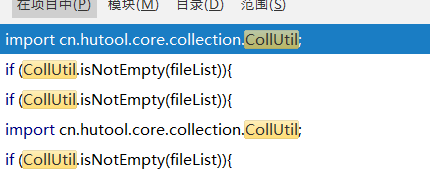
cn.hutool.json.JSONObject与JSONUtil
if (CollUtil.isNotEmpty(fileList)){
for (String e:fileList){
JSONObject jsonObject= JSONUtil.parseObj(e);
jsonObjects.add(jsonObject);
}
}cn.hutool.core.convert.Convert类型转换
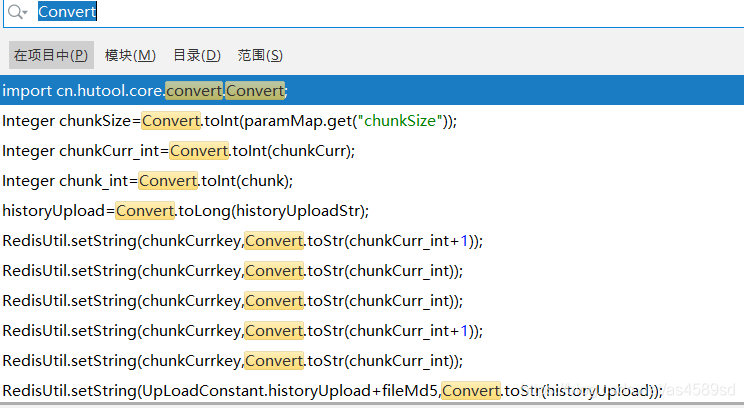
cn.hutool.core.util.RandomUtil生成随机字符串及StrUtil判断字符为空

解析文件的扩展名,来获该文件的类型
import cn.hutool.core.io.FileUtil;
FileUtil.extName((String) paramMap.get("name")));Ce qui précède est le contenu détaillé de. pour plus d'informations, suivez d'autres articles connexes sur le site Web de PHP en chinois!

